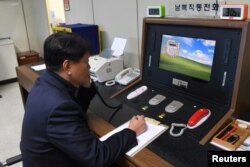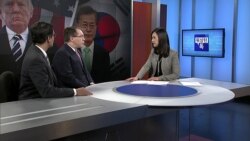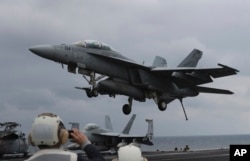U.S. President Donald Trump says he hopes the newly arranged talks between North and South Korea will go "beyond the Olympics" and promised the United States will take part "at the appropriate time."
Trump gave an unusual news conference Saturday at the Camp David presidential retreat, where he is meeting with Republican lawmakers. Of the upcoming talks between Seoul and Pyongyang, Trump said "I hope it works out."
"I would love to see them take it beyond the Olympics," he said. "And at the appropriate time," he added, "we'll get involved."
North Korea on Friday has accepted South Korea's offer of high-level talks on Jan. 9 at the truce village of Panmunjom in the demilitarized zone dividing the two Koreas, but only the Olympic Games will be discussed.
According to South Korea's Unification Ministry, North Korea on Friday morning sent a message saying it would accept Seoul's offer to meet at the border village to discuss Olympic cooperation and how to improve overall ties.
Ministry spokesman Baik Tae-hyun said it was expected the two Koreas would use a recently restored cross-border communication channel to determine who will head their respective delegations next week.
Any dialogue between North and South is seen as a positive step in improving relations on the Korean Peninsula, which would contribute to the overall stability in the region.
U.S. Defense Secretary Jim Mattis spoke over the phone with his counterpart in Seoul on Friday, who said the upcoming talks between the North and South would be "about the Olympics only," adding that the sporting event was historically kept separate from politics.
Mattis said the failure to discuss security in the upcoming Korea talks was not a "missed opportunity," but rather "an initial willingness on the part of DPRK" to open up a dialogue.
"It would be [a missed opportunity] if the other nations that are involved were in the room, but in fact, they're not," he said.
Katina Adams, the State Department's Bureau of East Asian and Pacific Affairs spokeswoman, told VOA on Friday, "We are in close contact with the Republic of Korea about our unified response to North Korea. As President Moon [Jae-in] stated, 'The improvement of relations between North and South Korea cannot advance separately from resolving North Korea's nuclear program.' "
North Korea expert Yang Mu-jin, a professor at the University of North Korean Studies in Seoul, said Friday that the return to formal dialogue between the communist North and the democratic South could have ramifications for denuclearization and regional peace.
"For the South, denuclearization is important, and for the North, negotiation with the U.S. is important," Yang said. "Thus, with the success of the Pyeongchang Olympics as a turning point, North and South will restore relations, and the South will persuade both Pyongyang and Washington to encourage North-U.S. dialogue. Furthermore, there is a possibility that this will lead to a positive direction toward denuclearizing the Korean Peninsula and establishing peace through four-party talks and six-party talks in the future."
Kim's motives
Scott Snyder, director of the U.S.-Korea policy program at the Council on Foreign Relations, told VOA's Korean service on Friday that it's hard to know the motives of North Korean leader Kim Jong Un.
WATCH: VOA Korean Service Interviews US-Korea Experts
"But I think that one of them probably is that he can also gain a benefit by participating in the Olympics with North Korean athletes, because whatever accomplishments the North Koreans have will also give them an opportunity to celebrate," Snyder said.
"At the same time, I do believe that he is testing President Moon and he is testing the U.S.-Korea alliance, and I think that we will see some requests or positions on the North Korean side that are intended to try to determine the extent to which the U.S. and South Korea are on the same page."
Frank Jannuzi, president of the Mansfield Foundation and a former adviser to the Senate Foreign Relations Committee, agreed in part with Snyder.
"I would say that he's probably looking for some economic benefit downstream," Jannuzi told VOA Korean. "The two countries that are most important for North Korea's economic future are China and South Korea, and with sanctions coming from the South and economic pressure also imposed by China in response to U.N. sanctions, Kim Jong Un may be looking to lighten the atmosphere, improve the overall mood on the peninsula and perhaps seek some easing in the economic pressure that is I think beginning to have an impact on their economy."
However, "I think that right now we cannot be confident that the U.S.-North Korea talks will necessarily get started just because there's this thaw in South-North Korea talks," he said.
Snyder added, "Washington, I am sure, will be watching the inter-Korean talks very closely. And so this provides an opportunity for the U.S. to evaluate what North Korea is doing, and in a way, North Korea has an opportunity to prove some of the skeptics about the prospects for a U.S.-North Korean negotiation wrong, if they can handle themselves well in inter-Korean talks."
The North's announcement Friday came shortly after the United States and South Korea decided to delay joint military exercises until after the Pyeongchang Olympics next month.
South Korea's Blue House, or the executive office, said Thursday that the decision on the maneuvers came during a phone call between U.S. President Donald Trump and Moon.
A White House statement said both leaders "agreed to deconflict the Olympics and our military exercises so that [the] United States and Republic of Korea forces can focus on ensuring the security of the Games."
Mattis downplayed the delay to reporters Thursday, calling it a "practical matter." He said the exercises would resume after the March 9-18 Paralympic Games, which will also be played in Pyeongchang.
The annual joint military exercises, known as Foal Eagle, are usually held between February and April and are one of the world's largest such drills. The exercises combine ground, air, naval and special operations to increase readiness to defend South Korea and the region. North Korea routinely objects to the exercises.
During Thursday's phone call, the White House said Trump and Moon "agreed to continue the campaign of maximum pressure against North Korea and to not repeat mistakes of the past."
Earlier, Trump tweeted that his "firm" and "strong" leadership was the impetus for a scheduled resumption of talks between North and South Korea.
Nike Ching at the State Department, Carla Babb at the Pentagon, and Eunjung Cho from VOA's Korean Service contributed to this report.










